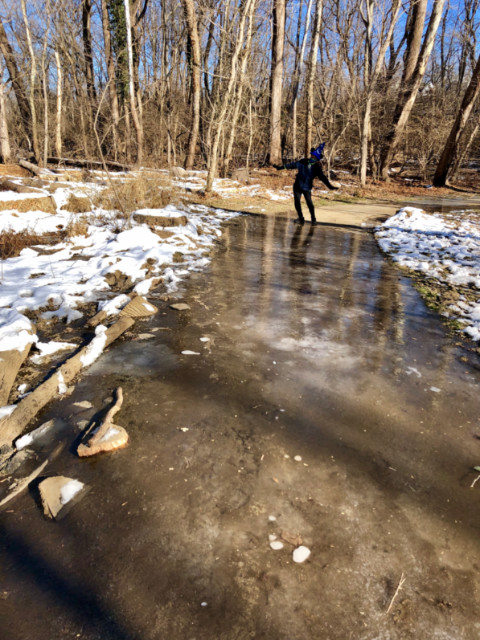

Howdy, pilgrim! No ads — you're in the ^zhurnal (that's Russian for "journal") — see ZhurnalyWiki for a Wiki edition of individual items; see Zhurnal and Zhurnaly for quick clues as to what this is all about; see Random for a random page. Briefly, this is the diary of ^z = Mark Zimmermann ... previous volume = 0.9935 ... complete list at bottom of page ... send comments & suggestions to "z (at) his (dot) com" ... click on a title link to go to that item in the ZhurnalyWiki where you can edit or comment on it ... thank you!
"We can't say ANYTHING today without it sounding like a double entendre!" Even the lawn art in DC is subject to naughty interpretation. Trail talk ranges widely to cover life and love and friendships and running and mindfulness. Eyes get misty as we walk through the Vietnam Veterans Memorial.
"The Lawn ... The Range ... The Grounds ..." Jeffersonian designs at J-Bird's alma mater are archetypal. And apparently the school did well last night at some obscure sport involving balls and bottomless baskets?
"The restrooms at that stable have hot towels and obsequious attendants — for the horses!" We pause at odd artwork and memorial overlooks. Roadkill branches east at mile 30 while Slow-Twitch and J-Bird proceed north. Fist bump salutes for a great day!
- Monday, April 22, 2019 at 04:36:28 (EDT)
On how to teach (and learn) most effectively, a comment made in 1766 by Samuel Johnson (in James Boswell's Life of Johnson):
... Talking of education, 'People have now a-days, (said he,) got a strange opinion that every thing should be taught by lectures. Now, I cannot see that lectures can do so much good as reading the books from which the lectures are taken. I know nothing that can be best taught by lectures, except where experiments are to be shewn. You may teach chymistry by lectures. — You might teach making of shoes by lectures!' ...
Yes, and one might argue that live lectures offer, in addition to demonstrations, potential for Q&A-interaction between student and teacher — which neither podcasts nor TED Talks provide. Hmmmmmmm ...
(cf Johnson on Anecdotes (1999-04-19), Read Through (2003-02-16), Picky about Facts (2003-03-11), Habitual Virtue (2008-12-18), Johnson on Virtue (2016-07-01), ...)
- Sunday, April 21, 2019 at 05:59:51 (EDT)
- Saturday, April 20, 2019 at 09:46:03 (EDT)
"Three shall be the number of the counting and the number of the counting shall be three. Four shalt thou not count, neither shalt thou count two, excepting that thou then proceedeth to three." J-Ro tells of the Holy Hand Grenade and how to handle it, while we trot westward in the dark toward Starbucks. It's E.R.'s first trek with the group. His phone alarm goes off at mile 3 as we walk up a hill and the sun begins to rise. "Time for me to wake up!" he says. K2 and Roadkill review the rules of Dawn Patrol:
And most important:
- Friday, April 19, 2019 at 04:20:39 (EDT)
Consider A:B::C:D analogy-ratio-relationships as 2x2 matrices? For instance, how the presence & absence of Respect & Empathy result in various feelings toward others:
| - | Respect | + | |
|---|---|---|---|
| + | Pity | Admiration | |
| Empathy | |||
| - | Rejection | Fear |
or how the Breadth-Depth dichotomy plays out against degrees of following standard past patterns in various professions:
| Breadth | ||||
|---|---|---|---|---|
| Artist | Entrepreneur | |||
| Break Rules | Keep Rules | |||
| Scientist | Builder | |||
| Depth |
or with arrows:
| mathematics | → | physics |
| ↓ | ↓ | |
| Category Theory | → | philosophy |
or without:
| horse | ship |
| land | sea |
or:
| contrast | epigram |
|---|---|
| resemblance | simile |
And consider other examples? ... meta-methods to build diagrams from kennings or semi-structured essays? ... the optimal format(s) to display relationships among concepts and analogies?
- Thursday, April 18, 2019 at 06:11:11 (EDT)
"Tall dark with room for cream!" J-Ro is initiated into Dawn Patrol's coffee ritual as he trots with K2 and Roadkill to Starbucks and back on a brisk Thursday morning. A waning Moon chases Venus low in the east. Trail talk includes photography, Oklahoma, ballroom dancing outfits, equestrian exercises, and a flock of other themes. Great day's start!
- Wednesday, April 17, 2019 at 05:36:45 (EDT)
"Are your loins well-girded?" Roadkill and Danger Man confirm that they're ready for evening intervals in the 'hood. After a warmup loop we dash up the long Belvedere Blvd hill and cruise down, three repeats of 1 mile each, with a couple of minutes to recover between. The sky darkens and stars begin to twinkle. A small cherry tree blooms beside the sidewalk.
"Two slices of salami, a small can of tuna mixed with a hard-boiled egg and mayonnaise, a caesar salad, leftover stromboli, a cherry Coke Zero - and two Oreos!" Today's pre-run repast is not well-balanced, but then neither are we. Thank goodness pizza isn't half-price tonight!
- Tuesday, April 16, 2019 at 05:33:19 (EDT)
Rafting down a long, lazy river — Pearl S. Buck's 1931 novel The Good Earth is a beautifully-written journey through protagonist Wang Lung's life in rural China during the late 19th and early 20th centuries. Vistas like flowers slowly unfold, then shrink and fade. Social structures exist and persist unquestioned: women are horribly mistreated, poor families starve, bandits steal, merchants cheat, the wealthy rule. The gods are worshiped, the elders are obeyed. Marriages are arranged, slaves are sold.
The story's language is artful in its simplicity, an extended minimalist poem. Consider a typical brief exchange in Chapter 2, when the protagonist's new wife unexpectedly brings him a bowl of hot tea:
Wang Lung saw that she was afraid of him and he was pleased and he answered before she finished, "I like it—I like it," and he drew his tea into his mouth with loud sups of pleasure.
In himself there was this new exultation which he was ashamed to make articulate even to his own heart, "This woman of mine likes me well enough!"
Wang works hard, makes foolish mistakes, prospers, fails, recovers, flourishes, and fades. The plot-river meanders into side channels and returns to the main course. Infrequently, white water tosses characters apart and rejoins them in new configurations.
And always, there's the land to plow and harvest, to build homes upon and journey across, to buy and sell, and ultimately to be buried in. Wars and revolutions pass. The good earth abides.
- Monday, April 15, 2019 at 07:22:05 (EDT)
- Sunday, April 14, 2019 at 06:25:41 (EDT)
A gently self-referential suggestion for letting go of excess perfectionism, in Lecture 16 of the 2011 "Practicing Mindfulness: An Introduction to Meditation" by Prof Mark W. Muesse of Rhodes College:
| Trying to be perfect takes a massive amount of energy, and in the end, it's a futile effort. Therefore, why not just accept the fact that perfection is completely unrealistic and yet you still want to be perfect? Be mindful of both your imperfection and your perfectionism. After all, perfectionism is part of your imperfection. |
Prof Muesse expands :
You probably see the flaws in human nature everywhere — in other people — and you probably already believe that imperfection is a human quality. The difficulty is in accepting that you're human like everyone else. For some reason, you think you're exceptional.
...
The Buddhist-influenced aesthetic ideal known in Japan as wabi-sabi seeks to highlight the beautiful aspects of impermanence, incompleteness, and defectiveness. Wabi-sabi values things that are rustic, asymmetrical, irregular, simple, and understated.
Objects that are worn or in the process of decay are appreciated both for their beauty as well as the spiritual truth they express about the transience and unfinished nature of life. Many of the classical art forms of Japan reflect this aesthetic sensibility — practices such as raku pottery, ikebana flower arranging, and haiku poetry.
Wabi-sabi invites us to look at life through a lens different from the one offered by perfectionism. The wabi-sabi view of life encourages you to feel more at home in the world, a world where all things, including yourself, could be regarded as aesthetically pleasing just for being what they are — subject to change, incomplete, and less than ideal.
To help ease your perfectionism, consider surrounding yourself with a few items that embody the wabi-sabi aesthetic to remind yourself that so-called flaws and defects can enhance the beauty of an object. These need not be pieces of art specifically designed as expressions of wabi-sabi. Rather, just take the time to look deliberately for objects that are conventionally flawed and yet bespeak the beauty of the flawed world in which we live.
In addition, try to embody the wabi-sabi ideal in what you do. Perhaps there is some activity you've wanted to pursue, but you've been hesitant for fear of not being able to do it right. Do it anyway.
Give up your attachment to success and failure and, instead, focus on the pure joy of what you are doing. If you're a perfectionist, you should find at least one thing in your life about which you can relax your need to succeed.
We can accept our common lot with humanity and we can try to rethink our understanding of perfection, but the greatest challenge may be embracing our own perfectionism. Trying to eliminate perfectionism is likely to prove counterproductive. There is a massive paradox: Wanting to get rid of perfectionism, if you think about it, is just another form of perfectionism.
Rather than responding with belligerence to the voice that's constantly criticizing and blaming you, why not try getting to know it better? Let it speak. It will probably do so whether you want to hear it or not.
Your inner critic is just a voice. You don't have to believe it. You don't have to do what it says. The critical voice of our perfectionism only causes us to suffer when we give it more authority than it deserves.
Our practice of mindfulness teaches us to allow thoughts to arise and fall on their own — like all impermanent reality. The thought that tells us we must be perfect is just a thought like any other.
Because trying to silence the critical voice hasn't worked, try to welcome perfectionism as a friend. Treat it with courtesy. Show it some compassion. Appreciate what it's trying to do for you.
Sometimes, the inner critic says valuable things. It's probably helped you achieve some good things in your life. Sometimes, of course, what the voice of perfectionism tells us is rubbish — but don't most of our friends tell us nonsense from time to time? And we still love them.
... all part of nonattachment and acceptance and being open and soft toward the constantly changing world — saying may and if to possibility, rather than deciding and choosing and finishing ...
(see [1] for a copy of the booklet "Practicing Mindfulness: An Introduction to Meditation" by Mark W. Muesse, Ph.D. in the "Great Courses" series; cf SocratesDissatisfied (2003-05-24), Worst and Bad (2008-10-28), Perfectionism vs. Individualism (2009-03-30), No Drama (2015-01-15), Six Bodhisattva Activities (2015-03-27), Without Anxiety about Imperfection (2015-05-21), Symmetry in Physical Laws (2015-12-12), Perfectness versus Goodness (2016-02-21), One Step at a Time (2017-08-17), ...)
- Saturday, April 13, 2019 at 04:23:37 (EDT)
Beautiful eulogy for a beautiful person: Henry Hardy's 1997 obituary "Sir Isaiah Berlin", 7 Oct 19976 in The Independent. Some excerpts:
Like other great men he was a catalyst of excellence. Those who have had the good fortune to know him can testify to the strikingly positive, enlarging, warming experience of being in his company and listening to his irrepressible flow of captivating talk. He was legendary as a talker both for his imitable rapid, syllable-swallowing diction and for his inimitable range — he was astonishingly widely read in a number of languages, he knew (and deeply influenced) a great many prominent men and women in England and elsewhere, and he peppered his conversation and writings with a bewildering cascade of names. (This was not name-dropping: the names were a shorthand for their bearers' ideas.)
and
... He positively relished what others would have found intolerable pressures and, though he was perfectly serious when the occasion demanded, brought a sometimes impish sense of fun to everything that he undertook.
He was not, and would not have wished to be, any kind of saint, but he had in abundance what he called in others "moral charm". This quality was particularly striking in his manner of conversation, which could unsettle those new to it. He did not stick to the point, but would sit back, look up, and follow his interest where it led, happily digressing, digressing from digressions, and unceremoniously returning to the topic of his own previous remarks, or changing the subject, apparently oblivious of what his interlocutor may have been saying, even at some length, in the interim.
This last idiosyncrasy might have seemed impolite in other hands, but in him it was clearly unselfconscious, and demonstrated his absorption in the issue before his mind, which he would pursue almost playfully, often in odd directions. Although talking to him made one's mind race, it could be infuriating if one wanted to sort out some problem and come to a clear conclusion, and he was not always an attentive listener — sometimes because he had a shrewd idea of what one was going to say before one had said it.
He had no taste for purely verbal word-play, but his wit, in the wider sense, was matchless. He could be bewilderingly quick on the uptake, and equally quick with an illuminating response. He was refreshingly direct and, for a man of his generation, unusually open: he made the obsessive circumspection of some parts of the Oxford establishment seem mean and life-denying by comparison. Gossip and anecdote abounded, but not malevolently: indeed, he was virtually incapable of innuendo, and did not seek to score points. Even when he propounded an unfavourable view of someone, it could seem more like a move in a game than a damning judgement.
He loved ranking people, and sorting them into types: most famously, hedgehogs and foxes — those in the grip of a single, all-embracing vision as against those who are more receptive to variousness. Indeed, his taste for light-hearted categorisation was an informal manifestation of his ability to extract and display the essence of a person or a difficult writer.
As a lecturer he had complete command of his material, and was spellbinding to listen to (fortunately several of his lectures were recorded, and can be heard at the National Sound Archive). He was consciously but not self-consciously Jewish, and a lifelong Zionist: his views counted for a good deal in Israel. He was a director of Covent Garden and a devoted opera-goer; he was a trustee of the National Gallery. He did not lack recognition — a knighthood, the OM, many honorary doctorates, the Mellon Lectureship, the Presidency of the British Academy, the Jerusalem, Erasmus, Agnelli and Lippincott Prizes — but always protested that he was being given more than his due, that his achievements had been systematically overestimated. He was larger than life, entirely sui generis, a phenomenon, irreplaceable.
and
... His encounter with Anna Akhmatova had an especially profound effect on him; and the many passages about him in Akhmatova's poems bear witness to its fundamental significance for her. "He will not be a beloved husband to me / But what we accomplish, he and I, / Will disturb the Twentieth Century" ...
and
His descriptions of those with whom he is in the closest sympathy often have a marked autobiographical resonance: he said of others, with dazzling virtuosity, what he would not have been willing to say of himself, what he probably did not believe of himself, though his words sometimes fit him precisely. Had he been sufficiently interested in his life and opinions for their own sakes, he would have been his own ideal biographer; but he would also have been a different man.
Isaiah Berlin was often described, especially in his old age, by means of superlatives: the world's greatest talker, the century's most inspired reader, one of the finest minds of our time — even, indeed, a genius. It may be too early to be sure about such strong claims. But there is no doubt that he showed in more than one direction the unexpectedly large possibilities open to us at the top end of the range of human potential, and the power of the wisely directed intellect to illuminate, without undue solemnity or needless obscurity, the ultimate moral questions that face mankind.
(cf IsaiahBerlin (2005-11-24), Systematic Overestimate (2009-01-30), Two Concepts of Liberty (2010-06-27), ...)
- Thursday, April 11, 2019 at 05:22:29 (EDT)
"And here's where my daughter and I ..." - "And here's where I recall ..." - "And here's where Mary and I ..." - "And here's where a little white dog ..." - "And here's where we found ..." - K2 and Roadkill ramble along happy hilly trails and share memories in Great Falls and Riverbend Park on a brisk early spring morning. Recent rains turn the usually-stagnant Patowmack Canal into a flood zone and peaceful Matildaville into a bog. Icy patches decorate wooden walkways and river waters rumble-roar over rocks. Floods have receded enough to make the Potomac Heritage Trail barely passable. We climb the ridge and take the Bootlegger Trail back, with detours on mountain bike paths. Afterwards, Roadkill stands in line for 90 minutes to visit the Hello Kitty Cafe Truck, shivering as chilly winds gust.
- Wednesday, April 10, 2019 at 04:17:14 (EDT)
Graham Allison and Philip Zelikow's book Essence of Decision is much more than what its subtitle "Explaining the Cuban Missile Crisis" promises. It's a case study in how to think about international events using mental models. Allison & Zelikow explore three methods at increasing levels of detail:
The events of 1962, when the USSR moved nuclear missiles into Cuba and then withdrew them, are Allison & Zelikow's archetypal example. In the concluding chapter the authors suggest a checklist of questions to ponder for each technique:
Analogous analytic tools directly apply to countless situations in history, business, and even personal life!
And what's missing? Perhaps an explicit recognition of probability — rough odds associated with competing hypotheses and alternatives — with thoughts on how to estimate and update those Bayesian likelihoods, along with comments on quantitative tests of one's models and their implications. Cue "Expert Political Judgment" by Phil Tetlock and colleagues, a few decades later ...
- Tuesday, April 09, 2019 at 05:47:04 (EDT)
Lovely wall art on the elementary school in Washington DC, at the corner of 14 St and Farragut St NW ...
 |
 |
 |
- Monday, April 08, 2019 at 05:34:42 (EDT)
"Lions and tigers and bears!" Roadkills warns J-Ro about hazards of the forest path beside Dead Run. "But don't worry: with three of us, odds are 2:1 that you won't be eaten!" Rain and wind pause for Dawn Patrol, led by K2, to finish a short loop around the neighborhood before morning meetings. J-Ro reveals that he speaks some Korean, Yemeni, and Hungarian, and that he survived a hurricane in Florida while caring for a menagerie of his friends' pets. We cut through a dark park and climb the stairs to Thrasher Road, which Roadkill misremembers as "Slasher Road". A nearly-full moon peeks between racing clouds.
- Sunday, April 07, 2019 at 05:42:13 (EDT)
"The Armpit of New Jersey!" J-Ro tells of growing up near towns that his parents forbade him to name. Dawn Patrol loops through Pimmit Hills and returns to the start at mile ~3, then continues east to Starbucks. In line with us is K2's neighbor; their kids were BFFs and fellow basketball stars at Langley High School. Small world!
"The secret is always to be writing a book," suggests K2, "so whatever happens in your life, you can be mindful about it and use it as material!" A fuchsia sunrise leads to laughter about gender differences in the ability to name colors. Roadkill struggles to recall another exotic hue, and after rejecting "aubergine" eventually comes up with "chartreuse". He speculates that perhaps it's like green? No matter - they're just words! We give thanks for the great goodness of the universe, as highlighted in today's Frank Bruni op-ed in the NYT. It features a conversation with Yale professor Nicholas Christakis, whose new book (Blueprint) is on that topic and is dedicated to his wife: "The world is better the closer you are to Erika." So lovely and loving!
- Saturday, April 06, 2019 at 05:52:39 (EDT)
In their Harvard Business Review article "The Feedback Fallacy" (Mar-Apr 2019) by Marcus Buckingham and Ashley Goodall, a fascinating table labeled "The Right Way to Help Colleagues Excel" subtitled "If you want to get into the excellence business, here are some examples of language to try":
| INSTEAD OF | TRY |
|---|---|
| Can I give you some feedback? | Here's my reaction. |
| Good job! | Here are three things that really worked for me. What was going through your mind when you did them? |
| Here's what you should do. | Here's what I would do. |
| Here's where you need to improve. | Here's what worked best for me, and here's why. |
| That didn't really work. | When you did x, I felt y or I didn't get that. |
| You need to improve your communication skills. | Here's exactly where you started to lose me. |
| You need to be more responsive. | When I don't hear from you, I worry that we're not on the same page. |
| You lack strategic thinking. | I'm struggling to understand your plan. |
| You should do x [in response to a request for advice]. | What do you feel you're struggling with, and what have you done in the past that's worked in a similar situation? |
... in other words, invert the instinctive viewpoint and comment on Self rather than Other!
And note that this is the complete opposite of common conversation, when it's mostly me-me-me and so rarely you ...
(cf. Feedback Fallacy (2019-03-19) and references therein ...)
- Friday, April 05, 2019 at 04:41:37 (EDT)
"He made me so happy yesterday! We filled six boxes this big," K2 holds hands wide apart, "with children's toys to donate." Dawn Patrol takes a cut-through in the dark over rocks and roots, between Holland St and Heather Brook Ct. Today's random unicorn card counsels "Talk about Your Feelings" and Roadkill obliges. We analyze clutter, poverty, sadness, anger, clinging, and other challenges. Begin at the end with the best answers: love, acceptance, awareness. Advice last year is still wise: "Ask yourself, 'What can I do to make this better?'" And of course self-care is essential. Plus friendships!
"Now run as fast as you can to the next corner!" K2 wears a green Sparty cap in celebration of Michigan State's victories. We attack hills and kick to the finish line. The "Boston Fan" voice of the GPS encourages: "Mom and Dad will be proud of ya, kid!" Yes, they already are!
- Thursday, April 04, 2019 at 05:32:57 (EDT)
Vernor Vinge describes the event that inspired his ur-Cyberpunk story True Names in an interview ca 1995 with Kevin Kelly:
Vinge: In '78 or '79, our university got a little PDP-11/44 with a few dial-in lines. In order to work from home, I bought myself an enormously expensive display with a keyboard and a 300-baud modem. One day, I was lurking around, and someone started talking to me with the Talk program. We chatted for some time, trying to figure out who each other was. Finally, I told him I couldn't talk anymore because, really, I was a personality simulator so, goodbye. After I broke that connection I thought, I just lived a science fiction story!
(cf Still True Names (2005-02-16), ...)
- Wednesday, April 03, 2019 at 04:36:52 (EDT)
"My thin is getting skin!" says Roadkill, transposing words inadvertently as he shows G-ji the latest scrape on the back of his hand. On the way to Ken-Gar he pauses to photograph an aggressive welded mailbox-sculpture and flowers in the front window of a bakery. If only it were open!
Danger Man joins the duo and we trot upstream along Rock Creek Trail, reviewing plans for upcoming races and greeting friends. Although temperatures are in the 30s, without wind we're warm. During the return trip Roadkill branches off to inspect the swampy path behind Dewey Park. Then G-ji heads for home.
"A train has been here recently - I see its tracks!" says Danger Man. We dash up the steep path, cross the rails, and loop back past antique stores, garages, warehouses, and a deli that promises breakfast and cold beer. If only it were open!
- Tuesday, April 02, 2019 at 05:28:19 (EDT)
"... someone sees a race, and they think that's what you do. They sort of know you had to train, but they weren't watching then, so they don't understand how incredibly much of it there is. But to us, it's almost the whole thing." The quote, from John Parker's novel Again To Carthage, comes to mind as Roadkill starts his 12th climb of the Mormon Temple hill. He walks up on odd numbers, runs up for the evens, and dashes down all the descents. Dawn arrives with rosy cloud-fingers. Sunbeams glitter on the bell of angel Moroni's trumpet. Chill northwest winds gust to 30 mi/hr. The Runamuck 50k is 4 weeks away. Maybe it's time for remedial hill-work?
"You may say I'm a dreamer / But I'm not the only one ...", the chorus to John Lennon's "Imagine", echoes. The random Unicorn of the Day is "Imagine". After a dozen repeats Roadkill walks up a 13th time and circles home via McKenney Hills, where a front-yard stone rabbit poses. A young man at Capital View Park seems sick, and gratefully accepts an unused bottle of Gatorade. Hope the electrolytes help him!
- Monday, April 01, 2019 at 04:21:53 (EDT)
On the 2018-06-22 Science Friday podcast "How Abstract Math Can Analyze Social Injustice" mathematician-musician Eugenia Cheng discusses the spaces between musical notes and J S Bach's Well-Tempered Clavier and beauty and joy and math:
... And I feel like I can sense Bach's excitement as he goes through the keys in these pieces. But it's amazing. He's never been able to write in this key before. And so I'm going to play a prelude in F sharp. [PLAYS NOTE ON PIANO]
Now, F sharp is exactly halfway between C and C. That means it's actually the square root of 2 away; the frequency ratio is the square root of 2. This interval is the least consonant interval, the most dissonant. It used to be called the devil in music, because it is the one in which the harmonics interfere with each other the most.
And I feel like I'm just sensing Bach's wonder that he can actually write a piece in F sharp for the first time. And so the piece is quite simple. Some of the pieces that are in more standard keys, like C minor or G minor, are really complicated. And I feel like it's because he's used to writing in those keys. Whereas this one, he's never been to before, so he just sits there and goes, "This is amazing."
Just like if you go to a beautiful beach for the first time. You don't do anything, you just stare at it and you go, "This is beautiful". Then he wanders around different keys feeling how beautiful it is to be able to go in these keys he's never been to before. And he doesn't stay in any of them for very long. And then he comes back to F sharp. And I just feel like it's almost childlike wonder. It's not a complicated piece, but it's in F sharp, which is the square root of 2. ...
(lightly edited transcript; cf Ingressive vs Congressive (2017-07-08), Eugenia Cheng on Thinking (2017-12-30), Many Worlds of Math (2019-03-15), ...)
- Sunday, March 31, 2019 at 06:21:53 (EDT)
"We need to be kinder to ourselves!" Roadkill admonishes K2. On a ridiculously warm morning, with pre-sunrise temps in the mid-60s, Dawn Patrol rambles to coffee and back in time for far too-many too-early meetings. Lingering coughs and low-grade injuries slow the pace. We speculate about future marathons and give thanks for good family news, good health, and good work to be done. If only there weren't quite so much of that last item ... and yet, it's a blessing!
- Saturday, March 30, 2019 at 05:42:39 (EDT)
"Maybe he hasn't had his coffee yet?" We speculate as to why a driver expresses annoyance at J-Ro for running in the street, his super-reflective jacket glittering in headlights. Yukon risks the sidewalk, roiled by tree roots; Roadkill takes the middle path, a grassy median. There's room for all. Temps hover in the upper 20s.
"You're on a slippery slope!" Roadkill warns of the looming temptation to run ultras. We trot around the neighborhood, walking the hills and enjoying the quiet. Venus hangs low in the east. Mademoiselle, a Runkeeper GPS voice, says "Oooh la la" a bit too often.
- Friday, March 29, 2019 at 04:28:25 (EDT)
From an online discussion this month titled "US Army applying new areas of math", insightful comments by Danny Wells:
I love that new areas of math are being applied, but (as a PhD applied mathematician) I disagree with the quote "Applied mathematics is not a subject classification. It's an attitude".
It has taken me years — an entire career, really — to learn to effectively communicate my mathematical findings to other non-mathematical researchers and effectively bridge these gaps. I know a lot of mathematicians who say "well, sure, I could communicate my work to other fields, but ... <some excuse here>", when the truth is, they just don't have the training or expertise for how to do it. It's not just that they don't want to/are too good to bother/etc./etc. (as much as they would like it to seem that way).
The fact is, translating research findings is hard. Much harder than actually making them. And asking good questions, relevant to the scientific field you are working in, even harder. The quote above reflects a common, damaging hubris in mathematics research and is why most of the "best" math research never gets used in other fields of science.
(cf Good Mistakes (1999-09-06), Good Mathematician vs Great Mathematician (2016-01-03), ...)
- Thursday, March 28, 2019 at 04:37:52 (EDT)
"'Good Morning'? No, it's 'Good Afternoon' -- blame Daylight Saving Time!" Roadkill admonishes multiple friendly folks who greet him and haven't yet reset their clocks. The midday trek to join Danger Man includes taking photos of mosaics at Flora Singer Elementary School, climbing a fence behind the Dennis Avenue Health Center, and cutting through a muddy right-of-way to reach the rendezvous at the promised 13:13:13 EDT. The precision team takes Sligo Creek Trail to the track, runs a 2:02 lap, then practices jumping up the stadium stairs. The journey home via North Hills Sligo Park discovers lots of dead-end streets and, eventually, the proper path.
- Wednesday, March 27, 2019 at 05:24:10 (EDT)
(trackfile + trackfile + trackfile)
- Tuesday, March 26, 2019 at 06:01:07 (EDT)
Williams College math Professor Satyan Devadoss wrote in 2010 ("Dream Chalk"):
... There have been rumors about a dream chalk, a chalk so powerful that mathematics practically writes itself; a chalk so amazing that no incorrect proof can be written using this chalk. I can finally say, after months of pursuit, that such a chalk indeed exists. It is called the Hagoromo Fulltouch Chalk.
For those lucky few who have used it, it can truly be called the Michael Jordan of chalk, the Rolls Royce of chalk. It is made in Japan, and is a bit larger than the classical American chalk. Moreover, it comes with a wonderful coating which protects the user from chalky hands. Once you've used it, there is no going back.
Devadoss also noted that better chalk can actually help one think better:
... Let's not be dualistic like the ancient Greeks, saying our minds and our bodies are distinct. We are a whole being, where the tools we use to write with impact what we write about. (The same can be said of ballpoint versus fountain pens, but that's another story.)
A flurry of essays in June 2015 quoted or echoed Prof Devadoss, when the company in Japan that made the chalk went out of business. (Not much commentary since then. Has intellectual progress slowed?)
(cf "Why Mathematicians Are Hoarding This Special Type of Japanese Chalk" by Sarah Zhang, "What's So Special about This Japanese Chalk" by Elizabeth Armstrong Moore, "A Teary Goodbye to Hagoromo" by Jeremy Kun, ...)
- Monday, March 25, 2019 at 05:59:18 (EDT)
"Ronald Dworkin's philosophy of law contends that principles are more important than legislated rules!" opines Danger Man, in response to the request for an erudite-sounding Quote of the Day. Professor R-Squared laughs and suggests a perhaps-impolite meta-quotation. We then return to analyzing sequels: The Incredibles 2, Deadpool 2, Wreck-It-Ralph 2, Tron 2, etc.
"Mud, mud, mud!" Gayatri summarizes yesterday's Seneca Creek race. Amazing that she and her friends survived the crazy-deep stream crossings, thorn bushes, and slippery rocks. We meet friends on the trail and Gayatri joins them in their run.
"Every climb wears away a nanometer!" Roadkill tells himself, as he sprints (?!) up the Mormon Temple hill. Today's ascent feels easier than yesterday's on the half-mile ~6% grade. Vermont's Runamuck 50k course features similar slopes, about 20 times as many. He does 4 repeats of the KenGar neighborhood path while awaiting the arrival of comrades. On the way there, pause to photograph arty sculptures at antique alley, wire-thin reminders that to get his weight down to 10 stone from today's 11.5+ will demand some serious sculpting. Chisel, please!
- Sunday, March 24, 2019 at 05:33:36 (EDT)
 | "Slow down - Caution Tape ahead!" Crabby saves Roadkill, who thinks he sees a finish-line ribbon and starts to sprint. Not for the first time! The duo cut their pace after a few miles when Crabby's knee gets crabby. |
| Drizzle has stopped; there's only ~0.001 the mud and puddles that friends doing the Seneca Creek 50k are enjoying this fine day. Lovely canine ornaments decorate lawns in Bethesda, Chevy Chase, and Kensington. |  |
 | "Does a gender-fluid one-person pronoun 'they' act as singular or plural for its verb? Does one say, 'They is wearing their dress'?" A pair of picky grammarians debate edge-cases in modern language. Pippi Roadkill plays Thing-Finder and arrives home with 2 Metro farecards, a happy-face pencil, a discarded yarmulke, and a fancy steel pocket-tool. |
| At mile 11 he attacks the Mormon Temple Hill and does a 5:55 half mile climb, much-needed prep for the "Runamuck 50k" in Vermont that he fantasizes about attempting in mid-April. Don't remind him about the DC Marathon 8 days away! |  |
- Saturday, March 23, 2019 at 05:40:52 (EDT)
Another reason to care about Category Theory, from a comment by Aloizio Macedo in an online math discussion:
What point am I trying to make? The point is: the important property that categories are really abstracting is structure itself. Category theory endows a mathematician with a capability to soar through the fields of mathematics with a broad vision. More than "inheritance of properties", there is identification of a common underlying structure. The naturality of such identification comes with time and experience.
And all the above is an understatement. The distillation process which category theory provides is a powerful tool in several aspects. For example, it is common to have a situation where we want things to exist and they are imposed by some condition. And the imposition commands the definitions, and proofs are matter of routine checking. ...
(cf Greatest Inventions (2011-06-09), Cakes, Custard, and Category Theory (2016-02-14), Category Theory Concepts (2016-04-25), Bird's-Eye View (2016-07-20), Category Theory for Programmers (2017-05-12), Ultimate Abstraction (2017-08-24), Put the Vast Storehouse in Order (2017-10-04), Yoneda Perspective (2018-10-03), Category Theory is like a Lighthouse (2018-12-24), Macro vs Micro (2019-02-03), ...)
- Friday, March 22, 2019 at 04:51:32 (EDT)
"Quit smiling! I'm not your mother!" - "Pick up your pace, maggot!" - The drill sergeant voice of Runkeeper offers tough love along with an occasional "Yee-Haw!" of encouragement. K2 and Roadkill trek cautiously across icy puddles to Starbucks, reminiscing en route about long-ago favorite restaurants ("formerly Coyote Taco, before that Taco Amigo" and "where Asian Corner used to be, now El Tio", etc.). Blister, hip, and mystery foot bump are all getting better. We reverse the route taken a few days ago.
- Thursday, March 21, 2019 at 05:41:50 (EDT)
- Wednesday, March 20, 2019 at 04:35:40 (EDT)
Contrarian thoughts by Marcus Buckingham and Ashley Goodall in their Harvard Business Review article "The Feedback Fallacy" (Mar-Apr 2019):
Underpinning the current conviction that feedback is an unalloyed good are three theories that we in the business world commonly accept as truths. The first is that other people are more aware than you are of your weaknesses, and that the best way to help you, therefore, is for them to show you what you cannot see for yourself. We can call this our theory of the source of truth. You do not realize that your suit is shabby, that your presentation is boring, or that your voice is grating, so it is up to your colleagues to tell you as plainly as possible "where you stand." If they didn't, you would never know, and this would be bad.
The second belief is that the process of learning is like filling up an empty vessel: You lack certain abilities you need to acquire, so your colleagues should teach them to you. We can call this our theory of learning. If you're in sales, how can you possibly close deals if you don't learn the competency of "mirroring and matching" the prospect? If you're a teacher, how can you improve if you don't learn and practice the steps in the latest team-teaching technique or "flipped classroom" format? The thought is that you can't—and that you need feedback to develop the skills you're missing.
And the third belief is that great performance is universal, analyzable, and describable, and that once defined, it can be transferred from one person to another, regardless of who each individual is. Hence you can, with feedback about what excellence looks like, understand where you fall short of this ideal and then strive to remedy your shortcomings. We can call this our theory of excellence. If you're a manager, your boss might show you the company's supervisor-behaviors model, hold you up against it, and tell you what you need to do to more closely hew to it. If you aspire to lead, your firm might use a 360-degree feedback tool to measure you against its predefined leadership competencies and then suggest various courses or experiences that will enable you to acquire the competencies that your results indicate you lack.
... interesting ideas, perhaps exaggerated, perhaps partially correct. Important in any case to recognize and model one's own theories of:
(cf Fifth Disciplinarians (2000-09-10), Invisible Instabilities (2001-02-24), Pursuit of Excellence (2002-02-22), Fearless Leaders (2003-08-27), How to Win Friends and Influence People (2008-05-17), Virtuosic (2009-11-10), Christensen on Humility (2010-09-03), Feedback Loops and Delay Lines (2010-11-10), How to Master Any Game (2016-02-18), Nine Beliefs for Success (2018-03-02), Do Something Else (2018-07-09), Amateurs v Professionals (2018-11-02), ...)
- Tuesday, March 19, 2019 at 06:10:38 (EDT)
 | "Twix!" Roadkill spies half a candy bar in a wrapper on the grass by the street. "Tastes great!" Nearby, Danger Man rolls his eyes. The duo rambles neighborhood streets, rediscover lost cut-throughs ("The Elusive Forest Glen!"), and arrive at a track to run a couple of brisk laps. Hypermodern architecture on Brunett Avenue brings to mind MAD Magazine and the infamous Three Pronged Blivet aka Impossible Trident aka Poiuyt. |
| On the way to Danger Man's home, an ice cream truck features SpongeBob SquarePants and other happy characters on sticks. Frozen joy! |  |
- Monday, March 18, 2019 at 04:59:46 (EDT)
"A 'Cricut' machine, kinda like a CNC lathe for paper!" - "Like scherenschnitte, on steroids?" - Dawn Patrol discusses modern craft technology as we finish a chilly McLean ramble to Starbucks and back. K2's kids had the mojo to make chocolate-covered strawberries materialize on her front doorstep yesterday. Roadkill blames meat products for his excessive chattiness. We analyze foot pains (neuroma? cyst? fibroma?) and their treatment. A sign on the local nursery promotes "Black Gold": not "Texas Tea" aka crude oil, but rather a brand of potting soil.
"Coaching and facilitating better thinking has been most of my entire career!" - "Under stress, people revert to their norm." - A recent class on Systems Thinking and a conversation with Dr K2's thesis adviser make for musings on how metacognitive self-awareness practice "... helps people be at their best more of the time ... 'on good form' ...", to quote Prof Guy Claxton. Worth making a habit of!
- Sunday, March 17, 2019 at 06:24:02 (EDT)
"Haven't seen you forever!" The lady walking a schnauzer greets Dawn Patrol, then crosses the street to hug a long-missed acquaintance. We're finishing a cool morning ramble around the neighborhood, punctuated by a pause at Starbucks. Roadkill rolls an ankle on a curb in the gloom, a fortunate accident since it masks the pain from a blister on the other foot. He and K2 tell K-Rex of the 10k race yesterday, taking turns crediting each other for the good outcome.
"Sometimes during a meeting I go into a meta state and start thinking about how many times I've heard this same argument before!" Metacognition is good, but the big challenge is to help advance the conversation without antagonizing the participants. No easy answers, especially when debate focuses on tightly-held beliefs about unimportant aspects of a larger issue. (cf Law of Triviality)
"Scones - with orange and lemon zest, but no clotted cream!" K-Rex baked over the weekend, and her family was happy.
- Saturday, March 16, 2019 at 05:23:05 (EDT)
In a recent NPR Science Friday broadcast Prof Eugenia Cheng talks about why she loves mathematics:
... those of us who love math love it for some of the same reasons that people hate it. So everyone hates it because they think it's about memorizing and about formulæ and about getting the right answer. Whereas we love it, probably because ... you don't have to memorize anything, because it's all about understanding, and there isn't a right answer. There are many possible different worlds in which different things can be true. ...
... it's all about understanding — yes, and ...
(cf Hal Clement (2003-11-05), Cakes, Custard, and Category Theory (2016-02-14), Beyond Infinity 2017-07-24),Mathematical Illumination (2017-08-07), Explicable and Inexplicable (2017-08-20), Eugenia Cheng on Thinking (2017-12-30), ...)
- Friday, March 15, 2019 at 04:28:31 (EDT)
"Fancy meeting you here!" Danger Man greets Roadkill at mile 7.6 of the George Washington Birthday Marathon, and they run a lap of the course together on a chilly Sunday. We salute Derek who, for more than a decade, provides music for runners (cf 2017-02-19 - GW Birthday Marathon etc). Fusillades of gunfire from a nearby range echo across fields of corn stubble. A tow truck rescues vehicles stuck in roadside mud.
"No weapons allowed? Then I can't enter!" Danger Man controls his deadly hands as we pass the Goddard Geophysical and Astronomical Observatory, its fences covered with warning signs. Earlier conversation mentions Chuck Norris, not (yet!) a Marathon Maniac. Roadkill lectures on electromagnetic theory when the course goes past a NASA antenna research facility. After surviving close to 2 hours of that, the remainder of the race is easy for Danger Man!
- Thursday, March 14, 2019 at 05:53:41 (EDT)
"We need ... to invent ... a Code Language ... to save breath!" K2 and Roadkill push hard and gasp encouragement during the MCRRC "Kemp Mill (C)hills" on a brisk Sunday morning. We start far back in the crowd and have to weave between runners for a downhill initial mile of 8.6 minutes, followed as crowds thin with solid splits of 9.6 + 9.7 + 9.5 + 9.5 + 9.5 and then a final uphill dash.
"Хорошо!" and "Спасибо!" Roadkill's Russian reaches its limit as he cheers fast Igor and gives thanks that we're in different age groups. Nearing mile 6, "2 minutes to spare!" he estimates, before realizing that 10k is 0.2 miles longer. Oops! Official results set K2's gun time at 1:00:03, tantalizingly close but not quite below 1-hour. Maybe next time, on less-undulating terrain!?
- Wednesday, March 13, 2019 at 04:30:55 (EDT)
A dear BFF's list of factors to consider when choosing a project to sign onto, a group to join, a corporation to stick with:
... quite akin to Life Partner Criteria or other long-term decision inputs!
(cf Life Partner Criteria Revisited (2016-06-02, ...)
- Tuesday, March 12, 2019 at 05:34:32 (EDT)
"Vienna Sausages? Slim Jims?" Roadkill, experimenting with carnivorism, wonders what fleshy products are the least-compassionate choices. (Veal and pâté de fois gras fall completely beyond the pale.) Chill north breezes lead to a couple of solo sub-10 minute miles, baby steps that inch toward the true speedwork he needs to train for upcoming endurance races. At Meadowbrook Stables horses and their young riders practice jumps over low flower-box barriers.
"He thought the note he carried said 'I don't eat animals' in Chinese, but it actually read 'I am a Buddhist'." A vegan friend of R2, traveling solo around China and not speaking the language, had asked for something to show people in restaurants or markets; he didn't get the literal translation that he expected. We ramble along Rock Creek, then divert west to avoid a construction zone. On Rittenhouse St NW a small house with bright trim features gigantic weathervanes and a painted pigeon statue.
"National Endowment for Libraries?" someone suggests, as a fortuitous encounter leads to discussion of books and their display. Libraries should be well-endowed! Homeward bound at his mile 10 Roadkill is startled to spy a familiar blue-and-white striped shirt and a "Clem cap". He tries to run between Dr Slow Twitch and Jaybird, but they block him. Banter ensues, with reminisces of long-ago long-runs together (e.g., 2013-04-07 - Fletchers Boathouse and Lincoln Memorial). So good to meet dear friends on the trail!
- Monday, March 11, 2019 at 05:34:18 (EDT)
"I dreamt that the barista wouldn't make a Zombie Ranger venti coffee for you," Roadkill tells K2, "because it was too early in the day for Starbucks to serve alcohol!" Dawn Patrol cruises a short route today to get back in time for early meetings. K-Rex tells of her son's creative-sweet Valentine for his sister, made entirely of Legos. Temperatures are in the 50s but winds make it feel cooler. We discuss the importance of learning Systems Thinking at all levels of an organization. As the sky brightens school bus drivers check their vehicles in the George C Marshall HS parking lot.
- Sunday, March 10, 2019 at 10:17:17 (EDT)
Archaisms are such fun! Although "inst." meaning "this month" is still sometimes seen, its siblings "ult." and "prox." seem to be extinct or almost so. From [1] on Alison Kilpatrick's site Arborealis:
- Instant, the current month: as On the 10th Inst. or inst.
- Ultimo, the month just past: as On the 10th ult.
- Proximo, the next month: as On the 10th prox.
"Instant," for instante mense, in the current month; "Proximo," for proximo mense, in the next month; "Utlimo," for ultimo mense, in the last month (Latin).
Source: Brewer, Ebenezer Cobham. Etymology and Pronouncing Dictionary of Difficult Words. London: Ward, Lock, & Co.; New York; 1882.
(cf Ai Ren (2004-03-02), Factor and Factotum (2004-11-04), ...)
- Saturday, March 09, 2019 at 04:29:06 (EST)
"Hound of the Baskervilles?" Two glowing eyes peer at us from the far end of the wooden bridge. Then they begin to shift hue, until one shines blood red and the other glows green. An ominous figure stands above them - who at our approach turns into the owner of a pair of friendly dogs, each with a light dangling from its collar. "Good morning!"
Dawn Patrol dodges puddles en route to Starbucks. In Bryn Mawr Park agile K2 avoids a swampy zone by leapfrogging across via slippery tree stumps; K-Rex and Roadkill take the muddy low road. A vacant 0.2 acre lot at the corner of Great Falls and Hunting is on sale, asking price $525,000. We discuss upcoming changes, new jobs, skillful ways to handle delicate relationship issues, and the happiness that comes from having friends to share life with.
- Friday, March 08, 2019 at 05:09:43 (EST)
"Draft Snake — or maybe Mouse Magnet?" Slow-twitch describes a craft project, a cloth tube filled with rice to block air flow under a door. A draft snake apparently can also become a feeding station for a cute rodent, one of whom is now BFF with her cat and dog. Early Sunday morning we converge on Fletchers Boathouse and ramble downstream along the C&O Canal. Ducks dabble in the water where it's not yet frozen. A bald eagle soars above the Potomac.
"You're both wearing Clem Caps!" K2 and Jaybird have identical headgear, named for a fellow runner whom Slow-twitch lent hers to during a super-cold ultra last year. Today with temps in the 20s Crabby, K2, Slow-twitch, and Roadkill trot together toward Georgetown, with Jaybird speedwalking behind as he recovers from injury. Alas, while four are in Starbucks one zips past and belatedly texts from the Lincoln Memorial, wondering where we have gone. Oops!
"There's nothing quite like it!" Crabby reminisces about rowing, crew, and scull — new interests of Slow-twitch's daughter. K2 describes a blizzard adventure, and near the waterfront we spy an abandoned copy of Ken Follett's novel Whiteout. Other jetsam includes tasty tater tots (yes, someone eats them) and a rainbow-unicorn party napkin. Roadkill's wizard hat (TY, Danger Man!) garners kudos from passers-by, including Mike Edwards who is shepherding a training run this morning.
- Thursday, March 07, 2019 at 05:48:07 (EST)
| Be Meta — mind all emptiness Attentive and awake, aware, Watching without a watcher to Transcend this time, and be ... Be Open — soft and flexible Accepting all and not attached, Fluid, possible, changing, Maybe not, perhaps, may be ... Be Kind — shining with total love Affirming and approving and at one, Saying "Yes, and" to all that is, and all That ever was, and will be ... |
(cf Core Buddhism (2011-10-17), Mantra - Mindfulness, Nonattachment, Oneness (2017-01-25), Mindfulness in Three Words (2018-06-13), Mantra - Be Meta, Be Open, Be Love (2018-11-11), Om - Fine and One and Blessed (2018-07-07), Meditation Map (2019-01-19), ...)
- Wednesday, March 06, 2019 at 05:22:29 (EST)
| "See the face? And the bird inside the cat?" A bright mural on the side of The Terano apartment complex lures us across the road. And when a mysterious path through the woods beckons we climb the Veirs Mill Road high metal guardrail (ouch!) and discover a "Trail To Nowhere" aka the unfinished Twinbrook Connector (see [1] for history and details). We run its full length, then turn around. Slow-twitch compliments Roadkill as he overcomes his OCD aversion to backtracking. Along Rock Creek Trail we dash up the hills to prepare Slow-Twitch for upcoming races. Roadkill's pointy Merlin hat (thanks, Danger Man!) brushes against branches overhead. He feels a burst of vertigo, perhaps from dehydration. Slow-Twitch gently suggests strategies to help get his weight back down. |  |
- Tuesday, March 05, 2019 at 05:57:54 (EST)
"Like Gnats on Crack!" Buzzing with energy, two comrades spend the weekend downhill skiing during a blizzard that drops 7 feet (!) of snow on the slopes. Avalanche-control explosions go off as they schuss by. Orange-clad rescue squad members eye them with disbelief in the resort lobby. They have the outdoor heated pool all to themselves. The flight homeward at 5pm on Sunday is on an aircraft storm-delayed from 8am. And all ends well!
"Who else would enjoy such a crazy adventure?" asks one.
"Let me tell you about my Dawn Patrol friends!" replies the other.
We meander through Langley on a foggy morning and find a Little Free Library full of like-new children's books. Roadkill spies a biography of Shakespeare titled Will in the World and recommends it to K2. A cookbook of fancy breads catches K-Rex's fancy. We share family news, happy and sad, hopeful and scary. Whatever happens we'll help each other get through it. All will end well!
- Monday, March 04, 2019 at 05:30:04 (EST)
Mark Chu-Carroll in his blog Good Math/Bad Math offers thoughts from a computer science perspective in his October 2018 post "Another Stab at Category Theory: Lesson one: Starting with Monoids":
Ok, so why should you care about category theory?
Category theory is a different way of thinking, and it's a language for talking about abstractions. The heart of engineering is abstraction. We take problems, and turn them into abstract structures. We look at the structures we create, and recognize commonalities between those structures, and then we create new abstractions based on the commonalities. The hardest part of designing a good library is identifying the right abstractions.
Category theory is a tool for talking about structures, which is particularly well suited to thinking about software. In category theory, we think in terms of arrows, where arrows are mappings between objects. We'll see what that means in detail later, but the gist of it is that one example of arrows mapping between objects is functions mapping between data types in a computer program.
Category theory is built on thinking with arrows, and building structures using arrows. It's about looking at mathematical constructions built with arrows, and in those structures, figuring out what the fundamental parts are. When we abstract enough, we can start to see that things that look very different are really just different realizations of the same underlying structure. Category theory gives us a language and a set of tools for doing that kind of abstraction — and then we can take the abstract structures that we identify, and turn them into code — into very generic libraries that express deep, fundamental structure.
(cf Greatest Inventions (2011-06-09), Cakes, Custard, and Category Theory (2016-02-14), Category Theory Concepts (2016-04-25), Bird's-Eye View (2016-07-20), Category Theory for Programmers (2017-05-12), Ultimate Abstraction (2017-08-24), Put the Vast Storehouse in Order (2017-10-04), Category Theory is like a Lighthouse (2018-12-24), Macro vs Micro (2019-02-03), ...)
- Sunday, March 03, 2019 at 05:39:04 (EST)
"Respect!" - "Fairness!" - "Responsibility!" - "Openness!" - "Caring!" — K-Rex and Roadkill ramble in the freezing-foggy darkness and share thoughts about dimensions of balance and justice in relationships. The Greeks called it arete (ἀρετή); the Romans, virtue. Bill and Ted said, "Be excellent to each other." Dawn Patrol meanders through Pimmit Hills, walking carefully across remnants of ice. Blinky lights under the eaves of one bungalow modulate through the color spectrum, ready to celebrate any seasonal holiday. An alert dog barks when it hears our conversation.
- Saturday, March 02, 2019 at 06:24:29 (EST)
 | "Fail falling forward!" Crabby and Roadkill concur on the spirit of the athlete (Greek "athlon" = feat or contest) — strive, fail, repeat — regardless of the realm. For some it's doing an ultra in an ice storm; for some it's adding a minute to time on the elliptical or pushing through one more push-up; for some it's driving to an event with the chemo drip-bag hanging from the rear view mirror; for some it's hitting "send" on an email, signing up to take a scary test. It's all about expanding the envelope, cheerfully going a step beyond the comfort zone and helping others do likewise. We chase a pair of fast runners for a 10:18 first mile, then settle down to walking with sporadic intervals of slow jogging. "Never look back!" Roadkill sneaks up behind Santa Steve and tugs on his t-shirt, and Crabby salutes Princess Penguin. We last saw each other at the Disney Dopey races 3 weeks ago. A passer-by on the Capital Crescent Trail takes photos, carefully posed with a snowy background to avoid showing the real urban Bethesda context. |
- Friday, March 01, 2019 at 04:51:21 (EST)
"Sanctuary!" say the deer nibbling grass near Cedar Lane Unitarian Church, standing their ground as a pair of two-legged technical-garbed monsters approach. On a brisk Saturday afternoon Crabby and Roadkill circle the neighborhood, catching up on news and plans three weeks after their Disney Dopey Challenge. A trio of cast-iron children play Ring Around the Rosie on a snowy front lawn. St Mary cradles the infant Jesus at the Holy Redeemer School in Kensington.
- Thursday, February 28, 2019 at 05:53:57 (EST)
Neil Gaiman's 2008 children's short novel Odd and the Frost Giants is ... odd. It feels as though it's striving — to be engaging, uplifting, innovating — and instead it's ... flat. The plot: pedestrian, with no real surprises. The language: workmanlike, with minimal imagery or metaphorical twist. The characters: gray, with voices that fade into each other. Akin to Gaiman's 2013 adult nightmare story Ocean at the End of the Lane, but at the JF/YA level. "Happy" ending. Page count achieved. Assignment completed. Meh ...
The illustrations by Brett Helquist, on the other hand: good!
(cf Rules for Writing (2010-03-07), ...)
- Wednesday, February 27, 2019 at 05:42:32 (EST)
 | "Hobbit Home!" Danger Man and Roadkill skate along icy sidewalks near Western Avenue to find an oddly-shaped concrete mushroom-like house that sold for 1.5 M$ just a few months ago. (cf [1]) Our journey includes pauses at a DC Boundary Stone (NW6), a snowy slope in Ft Bayard Park, and cheery playground art in front of Wesley United Methodist Church on Connecticut Ave NW. After some frigid days temps have risen to the mid-30s. |
- Tuesday, February 26, 2019 at 04:42:21 (EST)
"Brioche, damper (Australian soda bread), and a chocolate-coffee-cream-cheese cakey concoction!" K-Rex makes mouths water describing her family's weekend baking. Dawn Patrol pauses at Peet's, gaining a +0.8 mile GPS glitch in exchange for a gift of hot caffeine. Our retrograde orbit leads into the wind and through an under-construction zone where, some day soon, Yet Another Starbucks is fated to appear next door to a sports bar that promises 15 big screens of action. Life is Good!
"Should I add more weights to the bar? And is that enough, or do I actually have to lift once in a while?" Roadkill wonders whether more upper-body development could distract from his ever-expanding midsection. K2 reports on her daughter's battle with polar vortex chills in Michigan, while her son enjoys Floridian warmth and she faces a snowy Nevada future. "The mountains are calling and I must go!"
- Monday, February 25, 2019 at 04:30:04 (EST)
Comments in the Greater than Code conversation #118 "A Piece of Luck With Jessica Kerr" held in February 2019:
JAMEY: ... This is silly but I saw a piece of graffiti one time when I was traveling that I think about a lot and it said, "Everything will be okay in the end. If it isn't okay, then it isn't the end." I find that very comforting. I try to think about that as the comforting side of this kind of frustration in life, so I wanted to share.
JESSICA: Yeah, there are no endings but there is better. There are many, many, many tiny little betters and we can get those. There's a beautiful book called Finite and Infinite Games by James Carse that you can download the PDF online. That's really good about this because we do have finite games that we make for ourselves but in the end, life is an infinite game. There are no endings.
SAM: There may be an ending for you, specifically but it's not really an ending for everybody else. They go on. Even after you've died, your contribution can live on: your words, your ideas, some of your actions, they continue to have repercussions even after you've gone.
Such an important and comforting thought:
| "... there are no endings but there is better. There are many, many, many tiny little betters and we can get those ..." |
- Sunday, February 24, 2019 at 05:05:13 (EST)
- Saturday, February 23, 2019 at 05:40:58 (EST)
"Imagine what you'll know tomorrow!" says Roadkill to fast Frau Doktor when she suddenly sees, after living in the area for years, the Secret Pattern of Washington DC street names (alphabetized letters, then 1-syllable words, then 2-syllable words, etc. as one progresses northward). Discovery is fun! — as is quiet conversation with a wonderful friend, and revisiting landmarks, and sharing good news, and remembering great times together, and helping one another.
"They scold you as a Bad Parent if you jaywalk with your child across an empty road — but they blithely ride bikes without wearing helmets and let their 6-year-olds walk completely by themselves to and from school!" Doktor A reports never feeling more truly American than when in another country. We pause for photo ops at scenic corners, sculptures, and murals. The Dok's training pace is brisker than Roadkill's race pace, and he thanks her for every walk break. And yes — It's All Good!
- Friday, February 22, 2019 at 04:52:07 (EST)
"If you owe him forever, then he will never lack money!" observes the wise lady behind the counter at McDonald's, when Danger Man says that he will always be in Roadkill's debt for buying coffee today. We're recovering from a brisk Saturday morning trek along the C&O Canal with temps in the low 20's. Inside Starbucks at Washington Harbour the GPS glitches and adds half a mile to the trackfile. A hollow tree in Georgetown features tiny figurines. Trail talk includes an analysis of post-meal plate-stacking etiquette.
"Did you drop your beard?" asks a woman, who picks up a tuft of faux-hair from the ground at Fletchers Boathouse. As K2 leads the way back to our start we see a crowd gathering on the towpath, led by a swashbuckling pirate wielding a plastic sword and wearing an eyepatch, fake beard, and big black hat. In a thick Irish accent he starts the race, a free Parkrun 5k event. We divert to the parallel trail and run alongside. At the Arizona Avenue Trestle energetic Danger Man demonstrates how to leap up stairs, two-at-a-time. Back at the boathouse, when we pose with the pirate race director he loses his beard. Oops!
- Thursday, February 21, 2019 at 04:44:26 (EST)
Bob Dylan's 1974 song "Shelter from the Storm" speaks on many levels; it's a messy muddle of images and a razor-edged Zen koan and a group hug of all-that-was-and-will-be. The first three verses say it best:
| 'Twas in another lifetime, one of toil and blood When blackness was a virtue and the road was full of mud I came in from the wilderness, a creature void of form "Come in," she said, "I'll give you shelter from the storm" And if I pass this way again, you can rest assured I'll always do my best for her, on that I give my word In a world of steel-eyed death, and men who are fighting to be warm "Come in," she said, "I'll give you shelter from the storm" Not a word was spoke between us, there was little risk involved Everything up to that point had been left unresolved Try imagining a place where it's always safe and warm "Come in," she said, "I'll give you shelter from the storm" ... |
... yes, and to delaminate a few transcendent phrases of that:
(cf My Generation (2001-10-02), Lyric Notes (2002-03-29), Street Songs (2003-12-29), Southern Cross (2005-07-28), Mystery Religion (2005-02-08), Sound of Bangles (2005-08-24), John Darnielle (2006-09-24), If You Say 'Run' (2010-05-14), Nothing But Faith in Nothing (2014-09-07), Story of My Life (2016-03-04), Mantra - Things Can Only Get Better (2016-09-11), Stand by You (2017-01-11), Heroes (We Could Be) (2018-01-25), In Your Eyes (2018-08-04), ...)
- Wednesday, February 20, 2019 at 06:21:51 (EST)
"It's a Four-day Crush Zone!" declares K-Rex, as Dawn Patrol commiserates about how a holiday-shortened week becomes hectic when the usual five days of work gets squeezed into 20% less. Venus and Sirius glimmer side-by-side through high clouds, and a beautiful stained-glass window glows above a garage on Thrasher Road. Slick ice puddles turn exposed asphalt surfaces into skating rinks, even though the air temperature is slightly above freezing. Roadkill lectures on the physics of Planck-law black body radiation and why darker surfaces cool faster. K2 leads the way through neighborhood cut-throughs.
"You are the greatest athletes in the world!" We salute each other and debate whether decathlons or triathlons are appropriate next-steps beyond ultramarathons — and concur that injury avoidance and efficient use of limited training time are key factors to consider — not to mention glory and mental health and cultivation of friendships!
- Tuesday, February 19, 2019 at 05:22:57 (EST)
Writing in The New Yorker almost half a dozen years ago about health care issues, physician-researcher Atul Gawande riffs on the theme of Wicked Problems ("Something Wicked This Way Comes"):
In 1973, two social scientists, Horst Rittel and Melvin Webber, defined a class of problems they called "wicked problems." Wicked problems are messy, ill-defined, more complex than we fully grasp, and open to multiple interpretations based on one's point of view. They are problems such as poverty, obesity, where to put a new highway—or how to make sure that people have adequate health care.
They are the opposite of "tame problems," which can be crisply defined, completely understood, and fixed through technical solutions. Tame problems are not necessarily simple—they include putting a man on the moon or devising a cure for diabetes. They are, however, solvable. Solutions to tame problems either work or they don't.
Solutions to wicked problems, by contrast, are only better or worse. Trade-offs are unavoidable. Unanticipated complications and benefits are both common. And opportunities to learn by trial and error are limited. You can't try a new highway over here and over there; you put it where you put it. But new issues will arise. Adjustments will be required. No solution to a wicked problem is ever permanent or wholly satisfying, which leaves every solution open to easy polemical attack.
Two decades ago, the economist Albert O. Hirschman published a historical study of the opposition to basic social advances; "the rhetoric of intransigence," as he put it. He examined the structure of arguments—in the eighteenth century, against expansions of basic rights, such as freedom of speech, thought, and religion; in the nineteenth century, against widening the range of citizens who could vote and participate in power; and, in the twentieth century, against government-assured minimal levels of education, economic well-being, and security. In each instance, the reforms aimed to address deep, pressing, and complex societal problems—wicked problems, as we might call them. The reforms pursued straightforward goals but required inherently complicated, difficult-to-explain means of implementation. And, in each instance, Hirschman observed, reactionary argument took three basic forms: perversity, futility, and jeopardy. ...
"Perversity" means that the proposed solution will only make things worse; "futility" means that it won't make any difference; "jeopardy" means that costs will be so high as to hurt in other areas. All three are possible, and all three require modeling and systems thinking to confirm or refute. They aren't arguments; they're possibilities to analyze.
And then Gawande turns to the larger ethical and moral issues of selfishness and caring and good ...
(cf The Rhetoric of Reaction, Fifth Disciplinarians (2000-09-10), Circle of Concern" (2012-07-18), Thinking in Systems (2017-11-03), The World We Truly Want (2018-10-13), ...)
- Monday, February 18, 2019 at 04:56:16 (EST)
"Spit-take?" Roadkill suggests a comic way to feign surprise, when trying to conceal prior knowledge of a secret.
"Well, I've been told that I seem too calm," K2 says. "Perhaps if I tried that once and spewed coffee, I wouldn't ever need to again?" Dawn Patrol rambles carefully along icy sidewalks to Starbucks, K-Rex leading the way. Early morning meetings mandate a short trek. Landing lights on descending aircraft streak like comets in a foggy sky.
"You should take a cooking class; you could learn a LOT!" - "Go on that trip; you're not getting any younger!" - "Donate those clothes that are too tight; you'll never fit in them again!" We share stories of feedback from kids and comrades. "Thank you!" is always the right response.
- Sunday, February 17, 2019 at 06:35:54 (EST)
| Then it's time for hot coffee and a visit to the shoe store where Roadkill can't resist the Half Price Room. "But I saved so much!" |  |
- Saturday, February 16, 2019 at 07:18:50 (EST)
- Friday, February 15, 2019 at 04:47:32 (EST)
"No 'stache-to-'stache?" Bewiskered Roadkill and The Swabinator discuss how to perform CPR; the simplified modern method doesn't incorporate mouth-to-mouth resuscitation between consenting adults. "Fake stone!" A boundary marker at Westmoreland Circle is not one of the Oldest Federal Monuments, but Ken poses by it nonetheless, rabbit-ears added by R-Squared. The painted CowParade statue on Mass Ave attracts Roadkill who pauses for a selfie.
"Another one bites the dust!" - "Pennies from Heaven!" - "Jump!" - "Blowin' in the Wind!" And the music just keeps coming, while chill northwest winds whip and snow flurries commence. R-Squared riffs from Jack Black's School of Rock: "Isn't that a song?" - "No, I don't think so." - "Are you sure?" A fast couple sprints by us in the final quarter mile; we cheer them.
- Thursday, February 14, 2019 at 04:55:33 (EST)
G. H. Hardy (1877-1947) wrote A Mathematician's Apology in 1940, late in life, during wartime. It shows. The book is short, argumentative, often wrong. Hardy insists that the "pure" parts of mathematics and physics are irrelevant to ordinary life. How silly — increasingly, obviously so! His thesis that knowing "...a little chemistry, physics, or physiology has no value at all in ordinary life"? Ditto. His claim, "Real mathematics has no effects on war. No one has yet discovered any warlike purpose to be served by the theory of numbers or relativity, and it seems very unlikely that anyone will do so for many years ..."? Already wrong when he wrote them, more blatantly so now.
Wiser, perhaps, if Hardy had stood on his head, smiled, and said:
(cf Strands of Truth (2000-11-02), Millennium Math (2002-12-05), The Unreasonable Effectiveness of Mathematics (2008-02-17), Progress in Math (2017-07-30), Ultimate Abstraction (2017-08-24), ...)
- Wednesday, February 13, 2019 at 04:42:21 (EST)
"I'm down with that — or maybe I'm up for that?" Emaad and Ken compare modern ways to concur as they ramble with Roadkill and R-Square on a comfy-cool Saturday morning. We inspect two Boundary Stones placed in 1792 and proceed along the razor's edge between DC and MD, aka Western Ave.
"Dead animal products?" A farmers' market in Chevy Chase is mostly vegetarian, but the manager abashedly points to a carnivore-friendly section. We explore dead-end streets in search of new cut-throughs without luck. Emaad reports on a super-steep Marin County trail race last week. Roadkill recommends "The Mechanical Universe", a long-ago PBS series, for a fine introduction to freshman physics.
- Tuesday, February 12, 2019 at 05:34:09 (EST)
Like the ZhurnalyWiki Random Tarot and ZhurnalyWiki Random Unicorn Server, another click-to-mix-and-pick feature just installed: the ZhurnalyWiki Random Power Thought service. Optimism and cheer abound in this deck of 64 created by Louise Hay (1926-2017). See her corporation, "Hay House", for further information and to get a set of physical "Power Thought Cards".
Yes, and as with the "ZhurnalyWiki Random Tarot" service and other pseudorandom offerings here, click on the words "Power Thought" in the menu-bar at the top of all ZhurnalyWiki pages to get a chaotically-chosen bit of positive advice. Try one a day perhaps, let it nudge your mental state in a hopeful direction, and don't take it too seriously ...
(Power-Thought URL = "http://zhurnaly.com/dummy.html>")
- Monday, February 11, 2019 at 05:42:30 (EST)
For back issues of the ^zhurnal see Volumes v.01 (April-May 1999), v.02 (May-July 1999), v.03 (July-September 1999), v.04 (September-November 1999), v.05 (November 1999 - January 2000), v.06 (January-March 2000), v.07 (March-May 2000), v.08 (May-June 2000), v.09 (June-July 2000), v.10 (August-October 2000), v.11 (October-December 2000), v.12 (December 2000 - February 2001), v.13 (February-April 2001), v.14 (April-June 2001), 0.15 (June-August 2001), 0.16 (August-September 2001), 0.17 (September-November 2001), 0.18 (November-December 2001), 0.19 (December 2001 - February 2002), 0.20 (February-April 2002), 0.21 (April-May 2002), 0.22 (May-July 2002), 0.23 (July-September 2002), 0.24 (September-October 2002), 0.25 (October-November 2002), 0.26 (November 2002 - January 2003), 0.27 (January-February 2003), 0.28 (February-April 2003), 0.29 (April-June 2003), 0.30 (June-July 2003), 0.31 (July-September 2003), 0.32 (September-October 2003), 0.33 (October-November 2003), 0.34 (November 2003 - January 2004), 0.35 (January-February 2004), 0.36 (February-March 2004), 0.37 (March-April 2004), 0.38 (April-June 2004), 0.39 (June-July 2004), 0.40 (July-August 2004), 0.41 (August-September 2004), 0.42 (September-November 2004), 0.43 (November-December 2004), 0.44 (December 2004 - February 2005), 0.45 (February-March 2005), 0.46 (March-May 2005), 0.47 (May-June 2005), 0.48 (June-August 2005), 0.49 (August-September 2005), 0.50 (September-November 2005), 0.51 (November 2005 - January 2006), 0.52 (January-February 2006), 0.53 (February-April 2006), 0.54 (April-June 2006), 0.55 (June-July 2006), 0.56 (July-September 2006), 0.57 (September-November 2006), 0.58 (November-December 2006), 0.59 (December 2006 - February 2007), 0.60 (February-May 2007), 0.61 (April-May 2007), 0.62 (May-July 2007), 0.63 (July-September 2007), 0.64 (September-November 2007), 0.65 (November 2007 - January 2008), 0.66 (January-March 2008), 0.67 (March-April 2008), 0.68 (April-June 2008), 0.69 (July-August 2008), 0.70 (August-September 2008), 0.71 (September-October 2008), 0.72 (October-November 2008), 0.73 (November 2008 - January 2009), 0.74 (January-February 2009), 0.75 (February-April 2009), 0.76 (April-June 2009), 0.77 (June-August 2009), 0.78 (August-September 2009), 0.79 (September-November 2009), 0.80 (November-December 2009), 0.81 (December 2009 - February 2010), 0.82 (February-April 2010), 0.83 (April-May 2010), 0.84 (May-July 2010), 0.85 (July-September 2010), 0.86 (September-October 2010), 0.87 (October-December 2010), 0.88 (December 2010 - February 2011), 0.89 (February-April 2011), 0.90 (April-June 2011), 0.91 (June-August 2011), 0.92 (August-October 2011), 0.93 (October-December 2011), 0.94 (December 2011-January 2012), 0.95 (January-March 2012), 0.96 (March-April 2012), 0.97 (April-June 2012), 0.98 (June-September 2012), 0.99 (September-November 2012), 0.9901 (November-December 2012), 0.9902 (December 2012-February 2013), 0.9903 (February-March 2013), 0.9904 (March-May 2013), 0.9905 (May-July 2013), 0.9906 (July-September 2013), 0.9907 (September-October 2013), 0.9908 (October-December 2013), 0.9909 (December 2013-February 2014), 0.9910 (February-May 2014), 0.9911 (May-July 2014), 0.9912 (July-August 2014), 0.9913 (August-October 2014), 0.9914 (November 2014-January 2015), 0.9915 (January-April 2015), 0.9916 (April-July 2015), 0.9917 (July-September 2015), 0.9918 (September-November 2015), 0.9919 (November 2015-January 2016), 0.9920 (January-April 2016), 0.9921 (April-June 2016), 0.9922 (June-July 2016), 0.9923 (July-September 2016), 0.9924 (October-December 2016), 0.9925 (January-February 2017), 0.9926 (March-April 2017), 0.9927 (May-June 2017), 0.9928 (June-October 2017), 0.9929 (October-December 2017), 0.9930 (December 2017-March 2018), 0.9931 (March-April 2018), 0.9932 (May-July 2018), 0.9933 (July-September 2018), 0.9934 (September-December 2018), 0.9935 (December 2018-February 2019), 0.9936 (February-April 2019), 0.9937 (April-July 2019), 0.9938 (July-August 2019), 0.9939 (August-November 2019), 0.9940 (November 2019-February 2020), 0.9941 (February-June 2020), 0.9942 (June-August 2020), ... Current Volume. Send comments and suggestions to z (at) his.com. Thank you! (Copyright © 1999-2020 by Mark Zimmermann.)